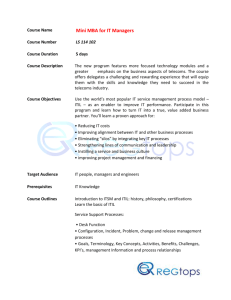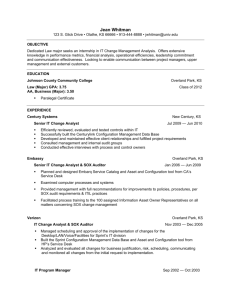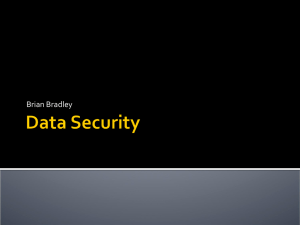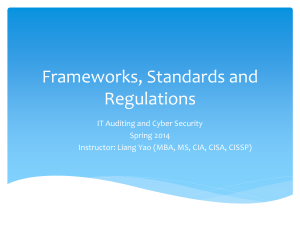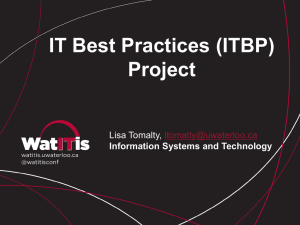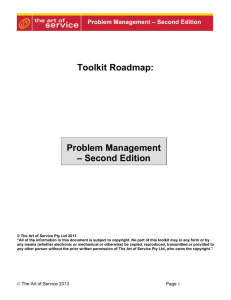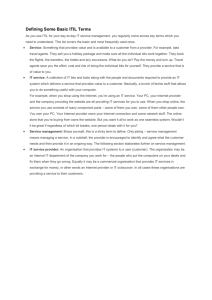Kamlesh Bajaj, CEO, DSCI
advertisement
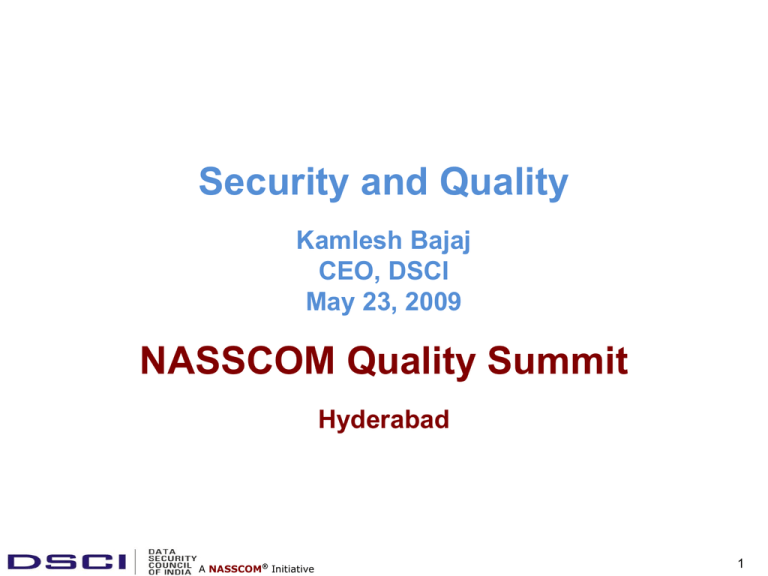
Security and Quality Kamlesh Bajaj CEO, DSCI May 23, 2009 NASSCOM Quality Summit Hyderabad A NASSCOM® Initiative 1 IT Services Management IT Operations Shifting from a technology-led siloed structure into a process-centric serviceoriented organization Organizing Framework To link technology components in infrastructure to the process steps that exist within IT Guiding Framework Link IT Processes to business activities and create service-level metrics IT Management frameworks Improve the management of IT ISO; CMMI; ITIL Allow for the systematic and least disruptive path to adoption Generic FWs; must be tailored to the specific needs of a company Support IT Governance imperatives 1. ISO 20000 1. Focus on certification 2. CMM 2. Describes process maturity 3. CMMI 3. Emphasizes process improvements 4. ITIL 4. Defines & leverages best practices for management and operations of IT org IT Management Frameworks organized into 5 logical subject areas 1. Project Management (PMBOK, PRINCE2...) Integrate new technologies and architectures into a service-oriented operation 2. Software development (TickIT, Agile, MSF, IT CMM...) 3. Process management (Software CMM, CobIT, ISO 15504, Six Sigma, TOGAF..) 4. Service management (ISO 20000, ISO/IEC 38500, ITIL, MOF, eTOM...) 5. Security management (ISO 27001...) 6. Strategy (Balanced Scorecard...) A NASSCOM® Initiative 2 IT Frameworks benefit both business and IT Six Sigma and ITIL 1. 2. 3. 4. Facilitate Business and IT alignment through quality Helps deliver high-quality IT services at min cost to business Provide both process and performance improvements Six Sigma focus on process; ITIL on best practices for delivery and support of IT services CMM and ITIL 1. Help streamline infrastructure and development processes 2. ITIL focus on service management (Operations); CMM focus on maturity of the organization that develops and maintains software 3. Interdependencies through three key processes: change management, configuration management, and release management CoBIT and ITIL 1. To measure ITIL in which ‘how’ of detailed tasks and steps absent 2. CobIT defines 34 processes; its performance measures define key performance indicators that ITIL processes must deliver against A NASSCOM® Initiative 3 Security and QA in SOX Compliance SOX Compliance 1. Controls and monitoring practices required not new to QA 2. Companies with strong QA groups ahead in SOX compliance QA’s independence 1. From applications development and the checks and balances performed by QA groups ensure adherence to best practices. 2. Implementing formal QA to standardize and document current processes for improvement and leveraging those practices for continued SOX compliance Restructuring of organizations 1. IT shops making testers part of centralized testing teams; not of development teams 2. Moving testing out of development and into operations. 3. Similar to Security Organization and IT Operations independence 4. Many IT functions, including quality assurance, security, architecture, and compliance, need some level of independence to avoid conflicts of interest. A NASSCOM® Initiative 4 QA and Security groups: synergize for Compliance QA important for compliance 1. Adds value through formal process 2. Audit not a one-time exercise, process helps culture change 3. Continual verification, validation, and audit processes via QA assist in changing culture while improving overall delivery practices 4. Nature of QA is to develop, review, and document: test plans or SDLC practices, the essence of QA is in the auditability of processes 5. Leveraging QA practices provides assistance in ensuring IT compliance Section 404 of SOX or in COBIT requires that internal controls be in place ; but does not specify 1. QA's primary role is to validate processes and document findings in SDLC QA Role expansion App Dev and delivery processes expanded to include compliance-related issues, such as risk, change control, and release management. 2. Employing similar QA practices to validate compliance with SOX can gain additional value. 3. Using existing QA processes brings visibility to detect potential risks of noncompliance, as well as planning strategies for correction and validation. A NASSCOM® Initiative 5 Triumph of Quality Management Frameworks A NASSCOM® Initiative 6 Framework for a Systematic, Comprehensive Approach to Information Security 7 ® A NASSCOM Initiative DSCI- Data Protection Practices Security Market Research Legal Forums Privacy Regulations Academic Collaborations Data Protection Authorities Knowledge Collaboration Security Technology Trends EU Privacy Directives DSCI- Best Practices Data Security Data Privacy Canada- PIPEDA Aus- Privacy Act 1988, APAC IT (Amendment) Act, 2008 Compliance Regulations Technology Forums • Mapping to compliance regulations • Adoption of leading practices • Micro level & customized • Easy of implementation GLBA HIPAA Technology and Vendor interactions US- FTC directives, Patriot Act Legal & Regulatory Requirements UK- Data Protection Act 1998 Architecture Principles Solution Categories Product, solution trends Technology advancement Security Vendor Collaboration Vendor forums, interactions Industry best practices PCI-DSS Security Management ISO 27001 Risk Management OCTAVE | COSO | FMEA Security Standards ITU-T X.1051 Security Practices NIST SP 800 8 ® A NASSCOM Initiative IT Governance CoBIT Infrastructure Mgmt ITIL | ISO 20000 Best Practices: Data Security and Privacy Privilege Account Management Access to personal information 164.310(d)(2)(iv) Data backup & storage 164.310(d)(2)(i) Disposal 164.3122(a)(2)(i) User identification Back-Up Media Handling Controls against Mobile code Physical Sec Eqp Security Reporting security events Access Cntrl Access User Mgmt Mapping of Compliance Regulations OECD Principles Control Identification Best Practice Framework Security Privacy ISO 27001 Best Practices Industry Standards Global Best Practices Privacy Principles Technology Trends 9 ® A NASSCOM Initiative Thank You A NASSCOM® Initiative 10
